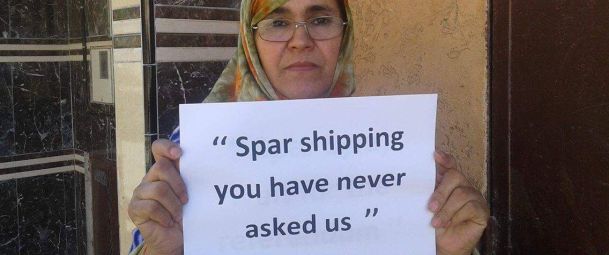18 March 2019
Brussels, Belgium
To the attention of Mr Sunil Sethy
Managing Director of Paradeep Phosphates Ltd
Re. Paradeep Phosphates Ltd’s imports of phosphate rock from Western Sahara
Dear Mr. Sethy,
Western Sahara Resource Watch (WSRW) is again privileged to write to you. We are seeking clarifications regarding Paradeep Phosphates Ltd’s (PPL) imports of phosphate rock from occupied Western Sahara.
We are in the process of finalizing the “P for Plunder 2018” report, documenting the phosphate trade from Western Sahara during the previous calendar year. Paradeep will be featured in that report. Accordingly, we would be grateful for your answers to the questions included below, so that we may accurately present your views on the matter.
Our research indicates that PPL has received six shipments of phosphate rock from the Bou Craa mines during the course of 2018. Our calculations put the total volume of those shipments at around 469,000 tonnes. That is a significant increase as compared to previous years, and also provides an indication that PPL will become the biggest importer of Saharawi phosphate rock in 2019, now that Nutrien Ltd has decided to abandon the trade.
The fact that PPL is in majority owned by Moroccan interests goes probably explains why the company seeks to engage in a trade that is unethical, and legally and politically highly controversial. It is our firm conviction that it cannot be in the company’s interest to be associated with such business.
The International Court of Justice in 1975 concluded that Morocco has no sovereignty over Western Sahara and the Saharawi people must be free to exercise their right to self-determination. Since 2016, that conclusion has been echoed for three consecutive times by the Court of Justice of the European Union, submitting that Morocco has no international legal mandate to administer Western Sahara and that the people of Western Sahara ought to explicitly consent in order for any economical arrangement between Morocco and another party to lawfully affect their land.
The United Nations consider Western Sahara as a Non-Self-Administering Territory - an unfinished decolonization. Over 100 UN Resolutions have acknowledged the Saharawi people’s right to self-determination, a right that includes the right to permanent sovereignty over their natural resources. The UN treaty bodies reviewing States’ implementation of the two International Covenants – on Civil and Political Rights, and on Economic, Social and Cultural Rights – have emphasized the need to obtain “prior, free and informed consent” of the Saharawi people in relating to resource exploitation in Western Sahara.
No State in the world, including India, recognizes Morocco’s claims to Western Sahara. Morocco’s military control over large parts of the territory have resulted in tremendous suffering and deprivation for the Saharawi people. Approximately 160,000 Saharawis are living in refugee camps in the most inhospitable parts of the Algerian desert, since 1975. While they are dependent on humanitarian aid, Morocco sells of the resources of their homeland as if it was entitled to do so. Protests against the trade by Saharawis remaining in areas under Moroccan control, are subjected to grave human rights violations, including torture, arbitrary detention and forced disappearances.
Purchasing phosphate rock from Western Sahara through a deal with a Moroccan state-owned company only serves to prolong the Western Sahara conflict. Not only does it lend an air of normalcy to what is a brutal occupation, but it even provides the aggressor with financial support, making it less inclined to fully engaged in UN-hosted peace talks.
WSRW sent you a letter in February 2015, March 2017 and February 2018, with four questions regarding your company’s role in the trade. We cannot see having received a response. We would still appreciate an answer to the following questions:
1. What has your company done to ascertain that the imports of phosphate rock from Western Sahara are done with the express consent of the people of the territory?
2. We would also appreciate it if your company could confirm having received an estimated volume of 469,000 tonnes of phosphate rock from Western Sahara during the year 2018.
Should you require any further information to fully engage the matter, do not hesitate to contact us. We look forward to your reply.
Sincerely,
Sara Eyckmans
Coordinator
Western Sahara Resource Watch
coordinator@wsrw.org
These are the clients of Morocco’s phosphate plunder
For the eleventh year in a row, Western Sahara Resource Watch publishes a detailed, annual overview of the companies involved in the purchase of conflict phosphates from occupied Western Sahara.
New report: Western Sahara phosphate trade halved
The export of phosphate rock from occupied Western Sahara has never been lower than in 2019. This is revealed in the new WSRW report P for Plunder, published today.
New report on Western Sahara phosphate industry out now
Morocco shipped 1.93 million tonnes of phosphate out of occupied Western Sahara in 2018, worth an estimated $164 million, new report shows. Here is all you need to know about the volume, values, vessels and clients.
Shipping company drops Western Sahara transports
In 2015 and 2017, the Norwegian shipping company Spar Shipping transported two large cargos of phosphate rock from occupied Western Sahara to India. The company announced today that further trade from the territory is out of the question.



